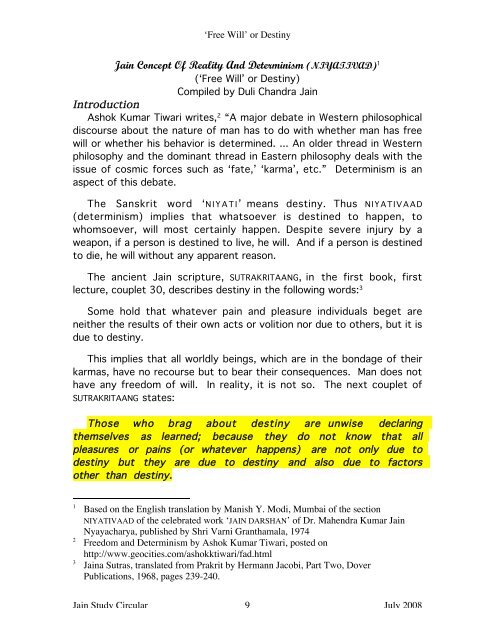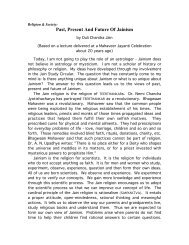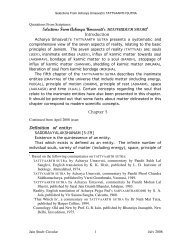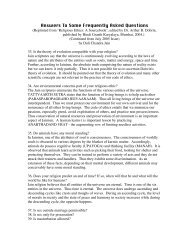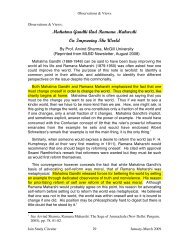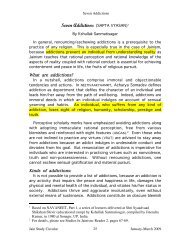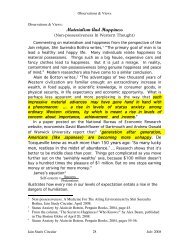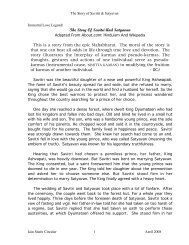Jain Concept Of Reality And Determinism (NIYATIVAD)1
Jain Concept Of Reality And Determinism (NIYATIVAD)1
Jain Concept Of Reality And Determinism (NIYATIVAD)1
Create successful ePaper yourself
Turn your PDF publications into a flip-book with our unique Google optimized e-Paper software.
‘Free Will’ or Destiny<br />
<strong>Jain</strong> <strong>Concept</strong> <strong>Of</strong> <strong>Reality</strong> <strong>And</strong> <strong>Determinism</strong> (<strong>NIYATIVAD</strong>) 1<br />
(‘Free Will’ or Destiny)<br />
Compiled by Duli Chandra <strong>Jain</strong><br />
Introduction<br />
Ashok Kumar Tiwari writes, 2 “A major debate in Western philosophical<br />
discourse about the nature of man has to do with whether man has free<br />
will or whether his behavior is determined. ... An older thread in Western<br />
philosophy and the dominant thread in Eastern philosophy deals with the<br />
issue of cosmic forces such as ‘fate,’ ‘karma’, etc.” <strong>Determinism</strong> is an<br />
aspect of this debate.<br />
The Sanskrit word ‘NIYATI’ means destiny. Thus NIYATIVAAD<br />
(determinism) implies that whatsoever is destined to happen, to<br />
whomsoever, will most certainly happen. Despite severe injury by a<br />
weapon, if a person is destined to live, he will. <strong>And</strong> if a person is destined<br />
to die, he will without any apparent reason.<br />
The ancient <strong>Jain</strong> scripture, SUTRAKRITAANG, in the first book, first<br />
lecture, couplet 30, describes destiny in the following words: 3<br />
Some hold that whatever pain and pleasure individuals beget are<br />
neither the results of their own acts or volition nor due to others, but it is<br />
due to destiny.<br />
This implies that all worldly beings, which are in the bondage of their<br />
karmas, have no recourse but to bear their consequences. Man does not<br />
have any freedom of will. In reality, it is not so. The next couplet of<br />
SUTRAKRITAANG states:<br />
Those who brag about destiny are unwise declaring<br />
themselves as learned; because they do not know that all<br />
pleasures or pains (or whatever happens) are not only due to<br />
destiny but they are due to destiny and also due to factors<br />
other than destiny.<br />
1<br />
2<br />
3<br />
Based on the English translation by Manish Y. Modi, Mumbai of the section<br />
NIYATIVAAD of the celebrated work ‘JAIN DARSHAN’ of Dr. Mahendra Kumar <strong>Jain</strong><br />
Nyayacharya, published by Shri Varni Granthamala, 1974<br />
Freedom and <strong>Determinism</strong> by Ashok Kumar Tiwari, posted on<br />
http://www.geocities.com/ashokktiwari/fad.html<br />
<strong>Jain</strong>a Sutras, translated from Prakrit by Hermann Jacobi, Part Two, Dover<br />
Publications, 1968, pages 239-240.<br />
<strong>Jain</strong> Study Circular 9<br />
July 2008
‘Free Will’ or Destiny<br />
Various Indian schools of thought have shed light on karma and<br />
determinism. Makkhali Goshaalak did not believe in self-endeavor. He<br />
believed in the wheel of destiny (NIYATICHAKRA). Buddhist works<br />
MAJJHIMANIKAAY and BUDDHACHARYA describe Makkhali Goshaalak’s<br />
philosophy as: There is no antecedent or determinant for the distress or<br />
relief of living beings. Neither soul nor matter is of any avail. Power,<br />
energy or audacity is ineffective. All that exists - living beings, souls,<br />
matter and the like, are powerless. Constrained by destiny, they undergo<br />
transformations and experience pleasure and pain. All religious ascetic<br />
practices such as penance, celibacy and mores are unavailing in mutating<br />
the situation. Ripening and shedding one's own karmas by self-endeavor<br />
is not an option.<br />
In recent times, Shri Kanjisvami has extended a spiritual twist of<br />
determinism. According to him and his followers, each and every<br />
modification of an entity (DRAVYA) is predestined. What is going to<br />
happen will happen owing to its intrinsic nature; any attempt to change it<br />
is bound to be fruitless. The innate nature is the substantive cause<br />
(UPAADAAN KAARAN) for the modification and the instrumental causes<br />
(NIMITTA KAARAN) appear automatically. 4 The justification for this claim is<br />
that one entity cannot interfere in the modifications of another.<br />
Accordingly, the modifications of each entity of the universe are<br />
predestined/predetermined for all times to come. Consequently, the<br />
future of all living beings, including man, has been predetermined by<br />
destiny. All efforts /endeavors are futile. These concepts are akin to<br />
determinism.<br />
<strong>Jain</strong> <strong>Concept</strong> of <strong>Reality</strong><br />
On a critical examination of the intrinsic nature of an entity coupled<br />
with the relationship between substantive cause and instrumental cause,<br />
the above argument does not seem to hold water, because it implies that<br />
consequences of ‘karma’ cannot be altered. Dr. S. Radhakrishnan<br />
argues, 5 “The same rule of law and scientific principles<br />
recognized in nature must also be recognized in mind and<br />
morals. He argues further that the theory of Karma, properly<br />
4<br />
5<br />
For a discussion of substantive and instrumental causes, please see <strong>Jain</strong> Study<br />
Circular, ‘Quotations From Scriptures’, October 2000.<br />
Freedom and <strong>Determinism</strong> by Ashok Kumar Tiwari, posted on<br />
http://www.geocities.com/ashokktiwari/fad.html<br />
<strong>Jain</strong> Study Circular 10<br />
July 2008
‘Free Will’ or Destiny<br />
understood, is not a theory of predestination, but rather a<br />
theory that is completely consistent with the causal laws of<br />
the universe.” These assertions conform to the <strong>Jain</strong> concept<br />
of universe and aspects of reality (TATTVAs).<br />
According to <strong>Jain</strong>ism, there are six entities (DRAVYAs) in the universe.<br />
Their interactions lead to the seven aspects of reality. The attributes of<br />
the entities of the universe are: 6<br />
1. The six entities are innumerable souls (JEEVs), innumerable aggregates<br />
of matter (including energy, PUDGAL), space (AAKAASH), principle of<br />
motion (DHARM), principle of rest (ADHARM) and infinite instants of time<br />
(KAAL). The sum total of each entity is eternally constant. No entity<br />
can be created or destroyed.<br />
2. Each entity, whether pure or impure, 7 continually undergoes<br />
transformation according to its intrinsic nature. In this process, the<br />
old form ceases to exist and a new form appears. However, its<br />
essence remains invariable. These modifications cannot be stopped<br />
or manipulated.<br />
3. One entity cannot be converted into another entity. Sentient entity<br />
remains sentient and insentient entity remains insentient.<br />
4. Two aggregates of matter can combine with each other but two souls<br />
cannot be joined together. Each soul enjoys its existence and<br />
undergoes modifications independently.<br />
5. The basic potentials and capacities of each entity are invariable. No<br />
new potential can be developed. Also no characteristic can vanish.<br />
6. Certain qualities of entities, such as undergoing transformations<br />
according to their intrinsic attributes, are common to all entities.<br />
Additionally, each entity, animate as well as inanimate, possesses<br />
certain characteristics that are unique to it.<br />
7. An entity possesses capacity for a variety of different modifications.<br />
However, that particular modification takes place for which adequate<br />
6<br />
7<br />
For details, please see ‘Quotations From Scriptures’, <strong>Jain</strong> Study Circular of January<br />
2008, April 2008 and the present issue.<br />
Worldly souls are impure because of their association with matter.<br />
<strong>Jain</strong> Study Circular 11<br />
July 2008
‘Free Will’ or Destiny<br />
instrumental causes are present. The capacities for other<br />
modifications remain in abeyance.<br />
8. The sequence of modifications is effected by the circumstances<br />
(environment) just as a chemical reaction follows different routes<br />
depending on the catalyst. Likewise, the interactions between worldly<br />
souls and matter are influenced by the environment (NOKARMAs).<br />
Conclusion<br />
In view of the above realities, the modifications of each entity,<br />
including those of a worldly soul, depend upon its intrinsic attributes<br />
coupled with its animate and inanimate surroundings. In the case of an<br />
individual, the inner self - his/her thoughts and feelings, constitute the<br />
substantive causes (UPAADAAN KAARAN) for the transformation, while the<br />
karmas associated with his/her soul and the presence of other living<br />
beings coupled with various material surroundings constitute the<br />
instrumental causes (NIMITTA KAARAN). In many instances, these happen to<br />
be beyond the control of the individual. Nevertheless, one can modify<br />
one’s thoughts and feelings and thereby alter the<br />
consequences of one’s karmas. This is the role played by ‘free<br />
will’. It is extremely consequential. It has a significant impact<br />
on our lives. Evidently, it acts like a catalyst and gives rise to<br />
initiative to modify one’s frame of mind as well as one’s<br />
animate and inanimate environment. In sum, according to the<br />
<strong>Jain</strong> concept of reality, there is no place for destiny or<br />
determinism in the scheme of things.<br />
* * * * * * *<br />
. . . the economic factor is an essential element<br />
in human life. There is no sin in wealth, just as<br />
there is no virtue in poverty. The efforts of anyone<br />
to increase his wealth cannot be condemned, but if<br />
the pursuit of wealth means loss to others,<br />
monetary or moral, then the question arises<br />
whether the acquisition of wealth by such methods<br />
and with such results is right. The Hindu code<br />
insists on the motive of social service, not personal<br />
gain.<br />
Dr. S. Radhakrishnan<br />
<strong>Jain</strong> Study Circular 12<br />
July 2008


